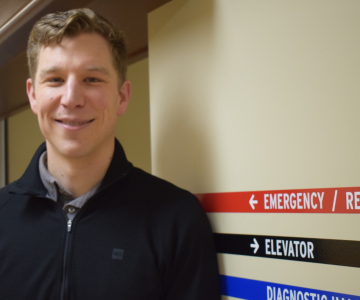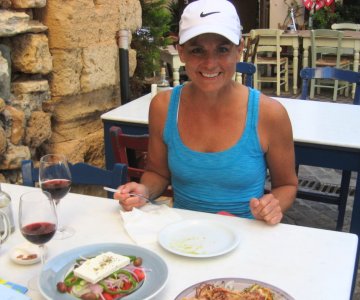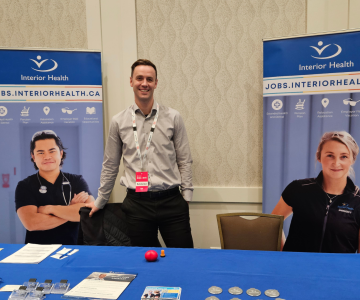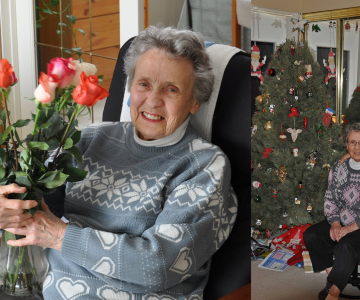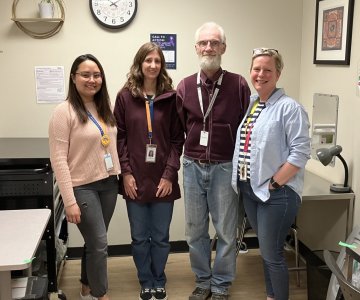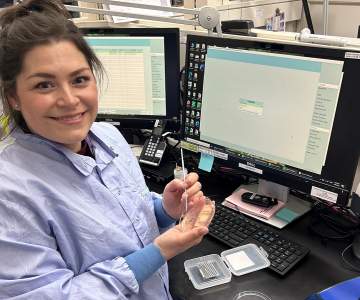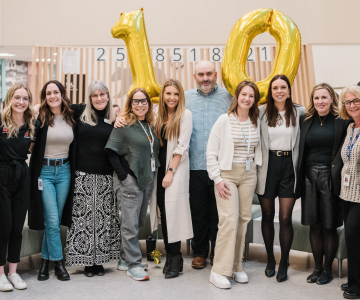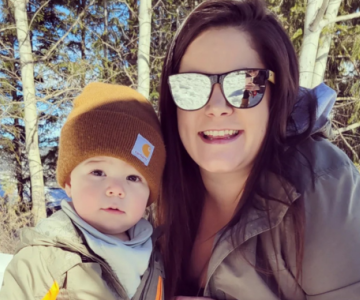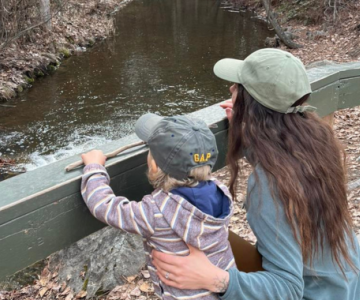Breadcrumb
Explore Stories
Community & Culture
Dr. Kyle Merritt realized he had to do more for the planet during a two-week stretch of thick wildfire smoke in 2021 that saw his family sheltering inside their Nelson home.
“As a parent of two young children, I was wondering how dangerous it would be for them to go outside,” remembers Kyle. “I also thought about the childhood I had growing up in Castlegar, playing outside in the forests – there were no wildfire seasons then. It hit me things are changing and changing quickly.”Wildfire smoke affects the most vulnerable in our community (Nelson Star)
The emergency department physician at Kootenay Lake Hospital was also seeing the effects of climate change in his patients. “My patients were being impacted by the heat and smoke, especially seniors and those with mental and chronic illnesses. They described feeling trapped and oppressed by the polluted air, and the number of people with depression and anxiety seemed to double,” he explains. “They were asking me for advice on how to adapt, whether they could take their newborn for a walk, or exercise outside.”
At around the same time Kootenay residents were suffering from heat and wildfire smoke, Kyle attended a climate emergency conference at UBC.
Kyle is an enthusiastic cyclist and supporter of active transportation.“Physicians from B.C. and all around the world were talking about planetary health,” shares Kyle. “This was a new term for me. It struck me, how can we think about human health without clean air and water? I also realized this kind of work could be part of my professional role at Interior Health.”
Kyle has long considered himself an environmentalist; he is a member of the Canadian Association of Physicians for the Environment. However, he knew then he had to do something bigger.
Community & Culture
Name: Coreen Duncan (she/her/hers)Job Title: Patient AmbassadorYears of Service: 34Worksite: Columbia HouseCommunity: InvermereAncestral Territory: Ktunaxa and SecwépemcFavourite Quote / Advice to live by: It is important to be kind.
Born and raised in Saskatoon, Coreen spent her high school years gaining experience volunteering at care homes and Meals on Wheels. Her volunteer experience and working as a housekeeper led her to Invermere with her current role as a patient ambassador in long-term care (LTC) at Columbia House.
“I remember thinking that I loved being with the elderly residents and clients. I felt that I could help make their days brighter. Thirty-four years later I still feel the same!”
Community & Culture
Welcome to the Meet Your Recruiter series, where we bring you closer to the dedicated professionals behind Interior Health's recruitment team. In this series, you'll have the opportunity to get to know the recruiters who play a vital role in attracting and selecting talented individuals to join our dynamic health-care team.
Discover their passions, expertise and invaluable insights as they share their experiences and shed light on the exciting opportunities that await you within Interior Health. As one of the largest health-care authorities in B.C., we are committed to providing exceptional care to the communities we serve. These are the people who help us fulfill this commitment.
Health & Wellness
Imagine being in a situation where you can't speak for yourself—who would you trust to speak for you? Or what if you needed to speak on behalf of a loved one, but don't know their wishes?
This is the situation Kevin Dunk found himself in 10 years ago when his mom was admitted to the hospital in Cranbrook. “The care aides at the long-term care home asked me where her green folder was,” he recalls. “I didn’t know what they were talking about, nor did the hospital staff know what a green folder was. The aides said to me, ‘You know, a Do Not Resuscitate form.’ She didn’t have a care plan. I realized not only how confusing the terminology is, but how important it is for caregivers, health-care providers and physicians to all be on the same page.”
Kevin’s experience led him to join Interior Health’s Patient Voices Network. Today, Kevin is one of the proud contributors from Patient Voices who helped create IH’s new My Advance Care Plan, a unique, easy-to-follow workbook that helps you record your wishes for your future health care.
“My experience with my mom opened my eyes. It may be uncomfortable, but the more we talk about our wishes, the less daunting it becomes and the closer we can get to where our truth may lie,” says Kevin. “My Advance Care Plan helps break down those barriers so you can have a normal conversation about end-of-life care so it’s not so fearsome.”
Health & Wellness
In the eight years since B.C. declared a public health emergency because of deaths due to unregulated drug poisonings, we’ve seen more than 14,000 people die in this province.
Do an online search about the toxic drug crisis, and the statistics jump out from the screen—numbers that are incomprehensible. But it seems the larger the numbers, the less compassionate we feel for the humans who have died. It’s called “psychic numbing,” a phenomenon in which the value of a single life diminishes the larger the tragedy. And this tragedy continues to grow.
But unlike deaths from natural disasters and disease in which those who have died aren’t considered at fault, the toxic drug crisis is shaded by stigma, shame, anti-Indigenous racism, labels and blame. Myths and misconceptions abound about who’s dying, where they are dying, and why.
On this eighth anniversary of the toxic drug crisis, we want to introduce you to three people who have lived experiences with unregulated drugs. All are peer volunteers for Interior Health, working in our offices, overdose prevention sites and as outreach workers to help others.
We asked them to share their perspectives, what they want you to know, and what you can do to change the conversation.*
Community & Culture
Name: Michelle HolmJob Title: Medical Laboratory TechnologistYears of Service: 14Worksite: Kootenay Boundary Regional HospitalCommunity: TrailAncestral Territory: Syilx and KtunaxaFavourite Quote: Be the change you wish to see in the world. — Gandhi
Michelle Holm is a medical laboratory technologist based at the Kootenay Boundary Regional Hospital (KBRH) in Trail, B.C. While she’s lived most of her life in Trail, she spent some years of her childhood growing up in Kamloops. Michelle is passionate about team-building, quality improvement, education and knowledge sharing.
Community & Culture
Foundations in the Interior Region raise funds that support medical equipment, care needs, and innovative local initiatives in their communities. Each organization includes respected community leaders, volunteers and staff who are passionate about meeting the needs of patients and families in Interior Health. Thanks to the generosity of their supporters, we all have a stronger health system.
In this second story of our series on the incredible health-care and hospital foundations throughout our region, we interviewed Heidi Coleman, CEO, Royal Inland Hospital (RIH) Foundation.
Community & Culture
Name: Gheboa Zeleniski (she/her/hers)Job Title: Support ServicesYears of Service: 5 yearsWorksite: Cariboo Memorial HospitalCommunity: Williams LakeAncestral Territory: Secwépemc First NationsFavourite Quote / Advice to live by: "Everything happens for a reason."
Born in Squamish, Gheboa (pronounced “Ja-bo-a”) Zeleniski comes from a large family of five brothers and two step-siblings. Her parents named her after an actress but changed the pronunciation slightly so her name sounded more French.
Gheboa’s Indigenous ancestors are from Saskatchewan, and include her great-grandmother, Dorothy Macquabeak Francis. Dorothy founded the first Indigenous friendship centre in Regina and was awarded the Order of Canada in 1978.
When she was a young girl, Gheboa and her parents travelled to a powwow in Broadview, Saskatchewan where her great-grandmother spent her early life. There, she was given the name “Peppermint Woman” by a North Dakota Medicine Man named Clifford Young Bear, a name that signifies strength and healing.
Health & Wellness
We’re exploring one of our most important natural resources: water. In part 1 of this two-part series, Do you know where your drinking water comes from?, we shared resources about our water operators and suppliers, and how to find out if you water is under an advisory.
In this story, discover how you can take care of your water supply and prepare for the spring and summer ahead.
-
Load More
Showing 270 of 832
Sign up for email updates
Receive news, alerts, public service announcements and articles right to your inbox.


